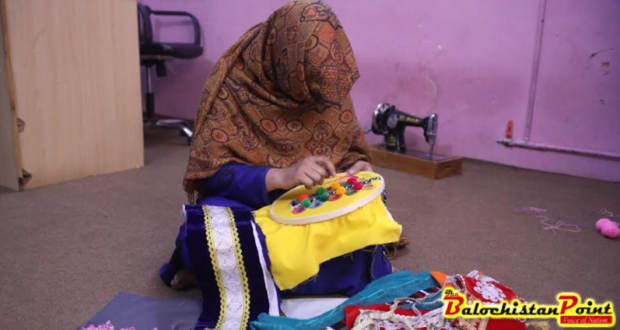By: Humera Karim
QUETTA: It was an uphill task for a 27-year-old Afghan refugee girl to live in a traditional society having no source of income, skills and exposure – but thanks to UNHCR’s Safe from the Start programme which skilled her and empowered her, she is becoming self-reliant.
Born and raised in Quetta, Fareeda Bibi’s family fled Afghanistan due to war. She and her younger sister were very young when their father decided to go back to Afghanistan in search of job opportunities, where he was killed.
Their mother remarried and both the girls were adopted by their paternal uncle. But he too died some 12 years ago, leaving four females helpless and vulnerable.
“My aunt, cousin and my younger sister had no source of income. I spent many years peeling dry fruits for shops to make ends meet,” she said adding their life was very tough until a master trainer from UNHCR project (Safe from the Start) visited their home in 2016 to tell them about the programme.
Fareeda Bibi is now a skilled craft worker. She makes hand and machine embroidery, and carpet weaving. “My life was uncertain but now I can see light, hope and a better future for myself and my family members,” she said.
Germany (KFW-CB) and LDS-USA, the Safe from the Start (SFS) is a livelihood and Sexual and Gender-based Violence (SGBV) awareness-raising project. Its aim is economic empowerment of vulnerable women in the Afghan refugee community in Quetta.
Since 2016, SFS trained 330 beneficiaries in five marketable skills such as kilim and carpet weaving, tailoring, hand embroidery, machine embroidery as well as computer and English language courses (for literate beneficiaries).
All trainees participate in numeracy, literacy, health and hygiene classes as well. Most of the female beneficiaries are not only skilled artisans but inspiring and empowering female change agents.
UNHCR and its partner IDO (the Innovative Development Organization) also launched ‘Online ArtisanShop’ to enable access to wider market opportunities for both refugees and Pakistani artisans.
The online E-Marketing website is developed to provide a dynamic platform for publicizing products developed by the skilled artisans and to also receive customized orders for these products from a much bigger market through the use of the internet and social media channels.
Around 70 per cent of the artisans earn Rs 7,000-8,000 per month, sometimes up to Rs 15,000, which they use for school fees for their children, health expenses and food for their family.
UNHCR has been assisting refugees by providing them with opportunities to learn skills and to utilize these skills in order to earn a living in a dignified manner.
Humera Karim is External Relations Associate at UNHCR Sub-office Quetta
Published in The Balochistan Point on January 14, 2019
 Balochistan Point Voice of Nation
Balochistan Point Voice of Nation




